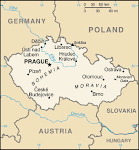
One of the best articles I've read on the current analysis of US-Russian relations and Russia's status quo: their intentions, objectives, and prospects. Perfect for anyone with a rudimentary knowledge of Eurasian affairs.
By MATTHEW KAMINSKI - WSJ
Barack Obama wants to make friends with Russia, "press the reset button" as his Veep proposed the other day.
Sounds familiar. Bill Clinton bear hugged Boris Yeltsin and George W. Bush peered into successor Vladimir Putin's soul. Yet relations haven't been this bad since Konstantin Chernenko's days at the Kremlin.
So what? America is on a roll in Eurasia. Democracy, open markets and stability spread across the region in the Clinton and Bush eras. From Estonia to Georgia to Macedonia, free people want to join the West.
At every step of the way, Russia sought to undermine this great post-Cold War project. Grant that the Kremlin acts in defense of its perceived interests but so should the U.S., and continue down this same path.
Here Foggy Bottom's finest chime in: Yes, but imagine a world with a friendly Russia, able to help us, say, stop Iran's atomic bomb program. So let's not push so hard to deploy anti-Iran missile defense sites in Poland and the Czech Republic that Russia hates -- use, if necessary, the excuse that costs and feasibility require further study. Back off on closer NATO ties for Ukraine and Georgia. Make Russia feel important and consulted. Joe Biden sketched out this sort of bargain at last weekend's Munich security conference.
The conceit is we can win the Kremlin over by modifying our behavior. Before Mr. Obama tries, he should be aware of recent history. On missile defense, American diplomats spent as much time negotiating with Russia as with the Central Europeans, offering Moscow the chance to join in. Nothing came of it. On Kosovo independence and Iran sanctions, Russia blocked the West at the U.N.
Last spring, NATO snubbed Georgia and Ukraine in a signal of good will to Mr. Putin. The day after, Mr. Putin privately told Mr. Bush that Ukraine wasn't "a real country" and belonged in the Russian fold. Five months later, Russia invaded Georgia and de facto annexed its breakaway provinces of Abkhazia and South Ossetia.
Mr. Obama may be tempted to think Russia can be won over. After all, they would seem to need America (short for the West) far more than America needs Russia. We're not the enemy. Russia's real strategic challenges are in the East: China looks ravenously at the vast, mineral-rich, lightly populated Siberian steppe cut off from Moscow (to this day, you can't drive across Russia). And to the South: The arc of Islamic extremism, starting with a possibly nuclear Iran, a competitor for Caspian energy and influence.
And as Mr. Putin discovers each day his economy sinks further, Russia failed to take advantage of sky-high oil prices to diversify away from energy. It sells nothing of value to the world aside from gas, oil and second-rate weapons. Its infrastructure is decaying and its population in decline.
A Kremlin leader with a long-term view would see these grave threats to Russia's future and rush to build a close partnership with the West. But the interests of Mr. Putin and his small, thuggish, authoritarian clique don't necessarily coincide with that of Russia.
The Obama magic dust doesn't seem to work on a regime defined and legitimized by its deep dislike for America. Dmitry Medvedev, the Putin underling in the president's office, moved the state of the nation address to the day after the American election to spin the outcome for the domestic audience. The U.S., he said into the winds of pro-American sentiment sweeping across the world in the wake of the Obama win, was "selfish . . . mistaken, egotistical and sometime simply dangerous."
The Kremlin then welcomed Mr. Obama into the White House with the administration's first serious foreign policy headache. Taking $2 billion from its fast-depleting reserves, Russia bullied and bribed Kyrgyzstan to close a U.S. military airfield, the main transport hub for supplies going into Afghanistan. Russia's desire for a "sphere of influence" trumps the threat of resurgent extreme Islamism in its southern underbelly.
The thinking here is Cold War porridge. But the Russians were never offered a new narrative. Mikhail Gorbachev's idea of a "European family" and Yeltsin's reforms foundered. Mr. Putin went back to a familiar recipe: Russia, empire-builder and scourge of the West.
A Cold War mentality lingers in America, too. A foreign policy caste rich in Sovietologists by habit overstates Russia's importance. The embassy in Moscow is huge; bilateral meetings inevitably become "summits," like in the old days.
Mr. Obama's fresh start is a good time for a reality check. The U.S. can work with Russia, seen in its proper place. To even suggest that the Russians have a special say over the fate of a Ukraine or our alliance with the Czechs lets Mr. Putin nurture the illusion of supposed greatness, and helps him hang on to power.
Ultimately it's up to the Russians to decide to be friends. One day, someone in the Kremlin will have to confront a hard choice: Does an isolated and dysfunctional Russia want to modernize and join up with the West, look toward China, or continue its slow decline? Until then, Mr. Obama better stock up on aspirin and dampen his and our expectations about Russia.























No comments:
Post a Comment